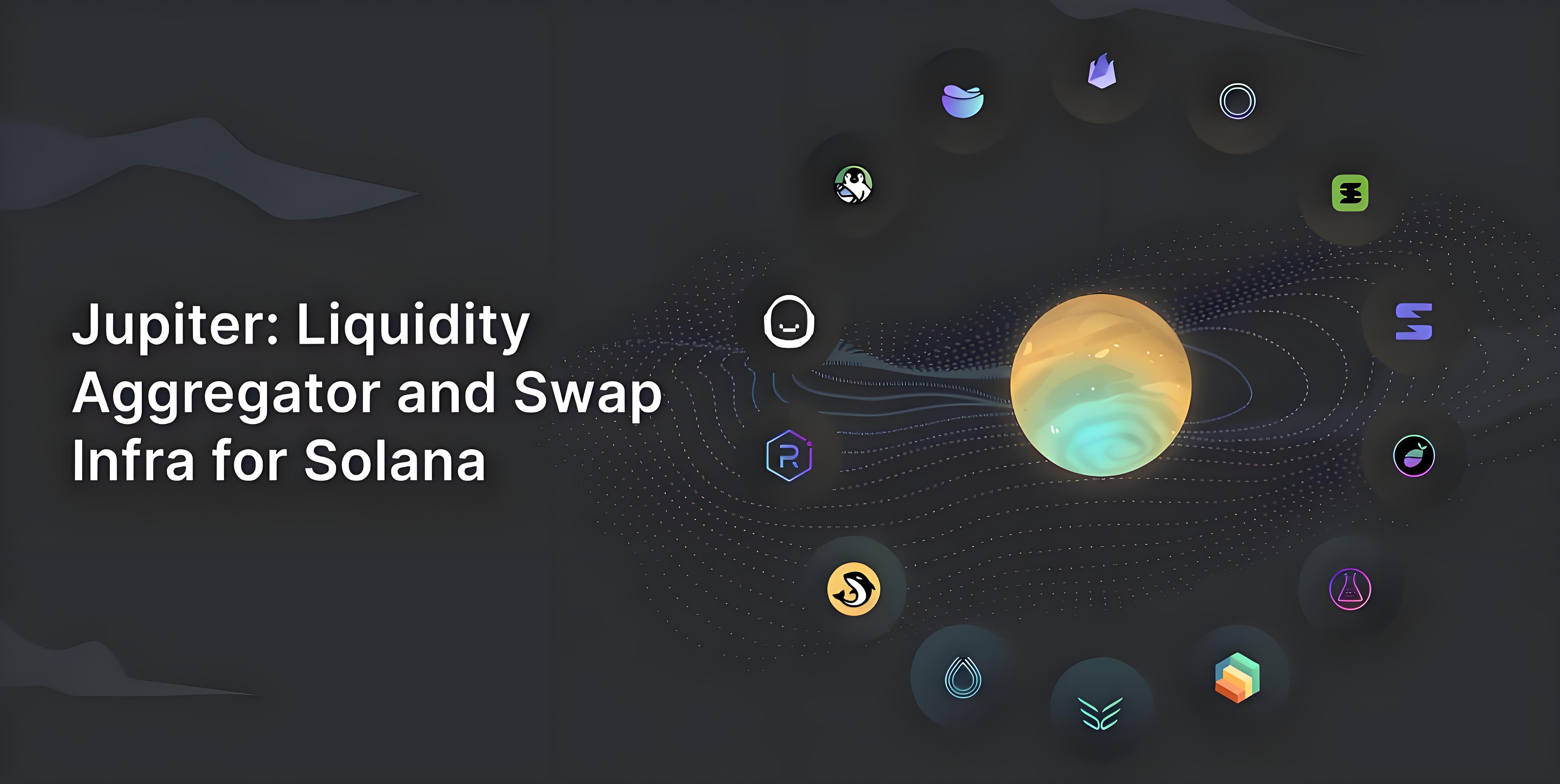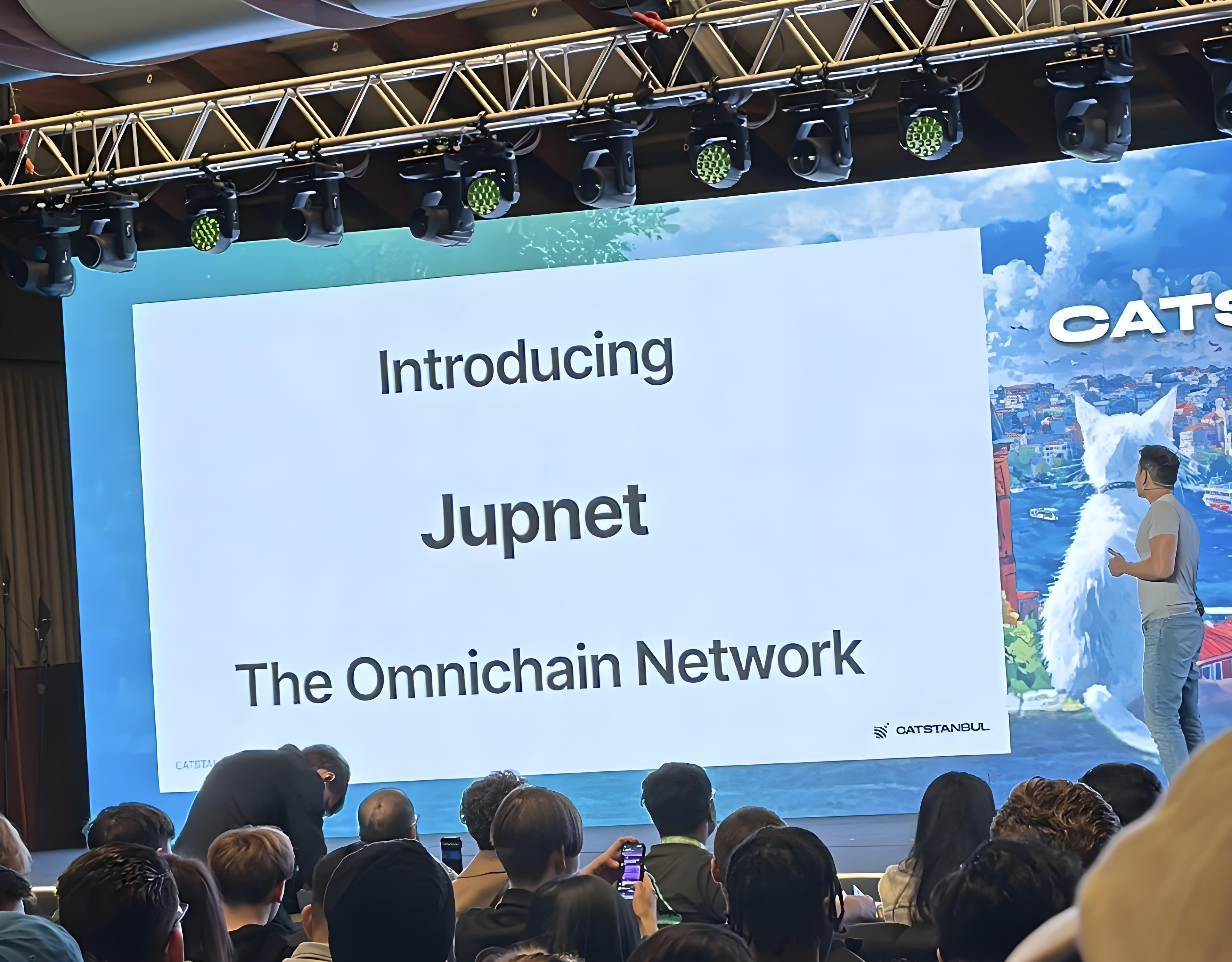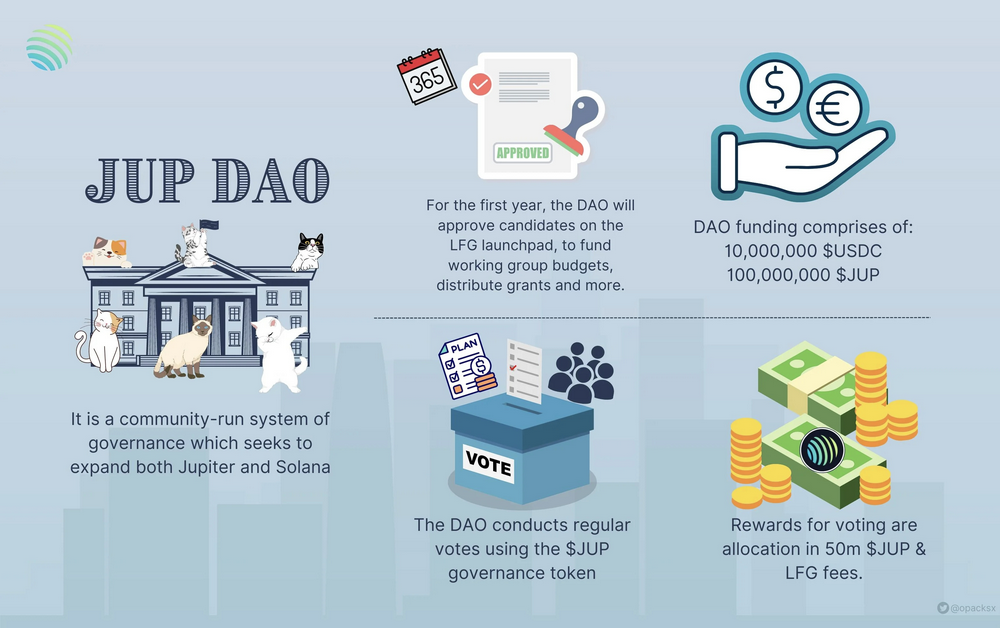Can 630 million airdrops and the launch of Jupnet make Jupiter ushered in your own highlight?

Reprinted from panewslab
01/26/2025·3M
Hash of this article (SHA1):
f1b3e93df4687ebfa91d4fc818bf9751f327d6ad04be85d263cdc9d0f69d5433
Number: Chainyuan Technology PandaLY Hotspot Insights Broadcast No.011
Jupiter Exchange is a decentralized exchange (DEX) aggregator based on the Solana blockchain, dedicated to solving the liquidity dispersion problem in the DeFi market and providing users with an efficient and transparent digital asset trading experience. Since its launch in 2021, Jupiter Exchange has quickly become an important part of the decentralized finance (DeFi) ecosystem. Recently, Jupiter announced the launch of the full-chain network Jupnet, taking a new step. From the beginning, it only focused on aggregating Solana's liquidity. Now, it plans to expand its goals to a broader ecosystem and create a full-chain network. Founder meow said, "Now we will turn to the next main goal, aggregating everything." In addition, Jupiter also launched a new community website jup.com, which will become an important information platform for the Jupiter community, providing information from the community DAO to the research forums and the latest project updates from the Jupiverse project ecosystem.
1. What is JupiterExchange

The core function of Jupiter Exchange is to help users easily discover and obtain the best trading prices by aggregating data from multiple decentralized exchanges. Users can access multiple liquidity pools on one interface, significantly improving transaction efficiency while reducing transaction costs. In order to meet the diverse needs of users, Jupiter has also introduced advanced trading features such as limit orders and dollar cost averaging (DCA), which make it stand out in the fierce market competition.
As part of the ecosystem, Jupiter's native governance token JUP creates a decentralized community governance framework, prompting users to participate in platform decision-making, and enhancing the community's sense of belonging and participation. Overall, Jupiter Exchange is committed to improving the accessibility and efficiency of DeFi through its flexible technical architecture, providing users with powerful trading tools and opportunities.
2. Jupiter technical highlights

Jupiter Exchange has made in-depth innovations in technical architecture and functions. The following is a detailed analysis of its four key points: "Swap", "Limit Order", "Dollar-Cost Averaging (DCA)" and "Value Averaging (VA)". Function.
Swap function
Jupiter's Swap function is one of its core features and is designed to provide users with the best trading prices.
Liquidity aggregation: By connecting to multiple DEXs (decentralized exchanges) within the Solana ecosystem, Jupiter aggregates the liquidity of different trading pairs. When users exchange assets, the algorithm will evaluate the price and liquidity of each DEX in real time to ensure that users obtain the lowest transaction cost.
Metis is an important part of the working principle of Jupiter Swap. It uses the heavily modified Bellman-Ford algorithm, which uses the algorithm to dynamically select the best trading path. Metis is ensured to run seamlessly on Solana's ultra-fast block times and with significant improvements to the backend infrastructure to support fast trade execution, it can efficiently find the most suitable trades even in volatile market conditions route.
To find the best price, Metis streams input tokens in real-time, gradually building out routes for splitting and merging at any trading stage. This innovation enables users to discover better prices for more complex transactions. For example, when a user wishes to trade token A for token C, the system can consider multiple routes, such as A→B→C, to determine whether it can be obtained Better price. Even to increase efficiency, Metis has merged the route generation and quote aspects, allowing it to provide the best prices while avoiding generating incorrect routes.
Limit Order function
Limit order is a type of trading order set by users through Jupiter Exchange, which provides users with a flexible and efficient trading method, allowing them to execute transactions at preset prices under specific conditions. When placing an order, the user specifies the price at which they wish to buy or sell, and Jupiter uses the Jupiter Price API to continuously monitor the price on the chain and obtain market data in real time. When the on-chain price of SOL is monitored to reach the set conditions, the system will automatically execute the limit order.
If the size of the order is too large and there is insufficient liquidity on the chain, the system will strive to partially execute the order in chunks to ensure that users can complete the transaction with as little market impact as possible until all orders are filled. Once the order is executed, whether in part or in full, the system will automatically transfer the completed tokens to the user's wallet, ensuring that users can quickly obtain trading assets.
In addition, the expiration time can be flexibly set, and users can set the expiration time for limit orders. If the order fails to be executed within the specified time, the system will automatically cancel it and return the tokens to the user's wallet, thereby avoiding unexpected market risks.
Jupiter’s limit order feature minimizes the risk of slippage caused by market fluctuations, ensuring users can still get their set trading price during periods of volatility. Additionally, placing orders using such an order ensures that the trade does not fail due to market price fluctuations.
Dollar-Cost Averaging (DCA)
Dollar-Cost Averaging (DCA) is a widely used investment strategy, especially suitable for dealing with market fluctuations. In Jupiter Exchange, using the DCA strategy allows investments to be spread over different times, rather than investing a large amount of money in a single transaction, avoiding the risk of buying near the peak, and helping to smooth the overall cost of the user.
Users can automatically configure the purchase quantity within a specified time interval according to their own investment plan. They only need to enter the amount of tokens they wish to invest, the price range and the investment time interval, and the system will automatically handle the rest.
Especially in bull and bear markets, users can buy more tokens at low points through DCA and maximize returns in the long term by smoothing the cost base, and users do not have to worry about when to enter the market. The automated investment process has Helps eliminate emotional decision-making caused by price fluctuations. .
Value Averaging (VA)
Value averaging method VA is a strategy that adjusts the investment amount by setting a target portfolio value, allowing users to flexibly change the investment amount according to market conditions.
Unlike DCA, VA allows users to adjust the investment amount based on market performance based on setting investment goals. Users can increase their investment when the asset price is lower than the target, and decrease their investment when the price is lower than the target. This flexibility allows users to maximize return on investment.
By using VA, users can automatically adjust their investments during the long-term investment process. This method allows users to seize market lows, thereby reducing the overall cost base and making it easier to lock in higher asset values when the market rises.
3. What will Jupnet be launched in the future?

Jupnet is a full-chain network that aims to aggregate all cryptocurrencies into a centralized book and connect multiple blockchains to improve the experience of users and developers and make transactions smoother.
Jupnet is driven by three main systems:
- DOVE Network : This is a centralized front-end machine responsible for the verification and execution of transactions, solving the current blockchain's single source of truth problem in a cross-chain environment. The design of the DOVE network ensures that multiple chains can be synchronized and consistent, thereby improving the security and efficiency of transactions.
- Full-chain ledger network : This network is capable of hosting full-chain ledgers on multiple chains, allowing users and applications to trade freely with decentralized funds. It implements the concept of dynamic finalization to facilitate rapid processing of transactions based on transaction size and circumstances, while simplifying complexity for developers.
- Aggregated Decentralized Identity (ADI) : Jupu uses a more friendly identity verification system to replace traditional wallets and provide users and developers with a more optimized access experience. By putting the identity verification framework on the chain, users can better control and manage their assets, improving security and recovery capabilities.
Jupnet's goal is to become a global unified market infrastructure that connects all possible trading assets and services. In the coming months, Jupnet will launch its first public beta and continue to drive the advancement of decentralized finance.
4. Jupiter DAO and JUP token economics

Jupiter DAO is a decentralized autonomous organization closely related to Jupiter Exchange, aiming to involve users in the decision-making process of the platform through community governance mechanisms. The establishment of Jupiter DAO embodies the core concept of decentralized finance (DeFi), in which the JUP token plays a vital role in the governance framework, providing holders with voting rights and decision-making rights to participate in project development.
Recently, Jupiter Exchange distributed 700 million $JUP tokens, worth over $590 million, to 2.3 million eligible wallets. This large-scale token distribution not only increases community participation, but also significantly improves the liquidity of tokens and promotes faster development of the project.
The total supply of JUP tokens is set at 10 billion, with a significant portion distributed to community members through airdrops and incentives. This distribution method can not only promote active participation of users, but also ensure the circulation process of tokens. At the same time, users holding JUP tokens not only have the right to participate in important decisions of the platform, but can also obtain additional income through staking and other methods. This mechanism effectively encourages users to hold and use JUP for a long time and builds a stable foundation for community participation. The specific token distribution structure is as follows:
- 40% — Community Growth and Airdrop : Used to stimulate community development, including airdrop activities and other community incentive programs, aiming to attract more users to participate and increase project activity.
- 20% — Token Sale : Distributed through the token sale to raise funds to support further development of the project.
- 40% - Internal staff and strategic reserves : allocated to project teams, consultants and strategic reserves to ensure the continued operation and long-term development of the project.
Jupiter DAO allows users to participate in key governance decisions by holding JUP tokens. The system will adjust voting weights based on user participation and token holdings to ensure the influence of active users in the decision-making process. Token holders can participate in voting on important matters such as the introduction of new features, allocation of ecosystem funds, and development of potential projects. By introducing a community voting mechanism, Jupiter ensures transparency and fairness in the decision-making process and promotes the real development of the project. Community members can vote on proposals to provide direction for the future development of the platform. This governance structure not only enhances the sense of community participation, but also ensures that the platform can quickly respond to user needs and market changes, and more clearly identify and solve the actual problems faced by users.
Recently, Jupiter has launched a new community website, jup.com, which is now open for user registration. This website will become an information collection platform for the Jupiter community. All the latest project developments will be unified into the community website, making the platform information centralized and collected. In one place, this can further enhance the interaction between community members and build a decentralized DeFi ecosystem that is completely driven by users.
Conclusion
The decentralized trading function in Jupiter Exchange paints a blueprint full of potential for the future development of the Solana ecosystem. By aggregating liquidity and providing diversified trading tools, it enables users to complete transactions in a more efficient way. The launch of Jupnet will further expand this vision, enable the interconnection of various crypto assets, promote innovation and development in the entire DeFi field, and expand the overall scale of DeFi to promote more financial activities and transactions.
In a rapidly evolving and diverse crypto market, flexibility and innovation will be key to success. In the context of changing user needs. Jupiter must continue to optimize platform functions and security to ensure the long-term and stable development of the ecosystem. Although the road ahead is long and arduous, every innovation and progress in blockchain projects is laying the foundation for the future of decentralized transactions and enabling wider cryptocurrency applications.


 chaincatcher
chaincatcher

 jinse
jinse